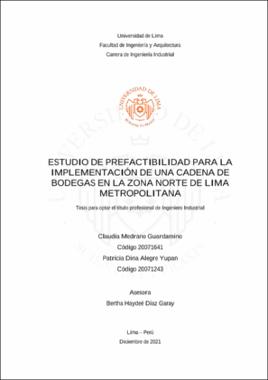Mostrar el registro sencillo del ítem
Estudio de prefactibilidad para la implementación de una cadena de bodegas en la zona Norte de Lima Metropolitana
| dc.contributor.advisor | Díaz Garay, Bertha Haydeé | |
| dc.contributor.author | Medrano Guardamino, Claudia | |
| dc.contributor.author | Alegre Yupan, Patricia Dina | |
| dc.date.accessioned | 2022-03-11T14:19:50Z | |
| dc.date.available | 2022-03-11T14:19:50Z | |
| dc.date.issued | 2021 | |
| dc.identifier.citation | Medrano Guardamino, C. y Alegre Yupan, P. D. (2021). Estudio de prefactibilidad para la implementación de una cadena de bodegas en la zona Norte de Lima Metropolitana [Tesis para optar el Título Profesional de Ingeniero Industrial, Universidad de Lima]. Repositorio institucional de la Universidad de Lima. https://hdl.handle.net/20.500.12724/15287 | es_PE |
| dc.identifier.uri | https://hdl.handle.net/20.500.12724/15287 | |
| dc.description.abstract | The wineries, establishments belonging to the traditional channel in Peru, played an important role during the COVID-19 pandemic. Although at first these businesses were affected little by little, they were able to recover and adapt to the behaviors of consumers and also to the protocols that had to be implemented to continue with the attention to the public. The problem addressed by this research is the lack of establishments that offer products of mass consumption not only going to the place but also via a web page or a phone call, without losing the friendly service that provides a hold of the neighborhood; it is for this reason that it is proposed to implement a string of wineries with different means of payment, delivery, payments of basic services, care, biosecurity and pleasant buying experience in the Area of North Lima, taking as selected districts Comas and Carabayllo. The methodology used in the research was to survey those responsible for household purchases on key points during the purchase process in order to evaluate their behavior. In addition, secondary sources were used to have a wider scope of study. The research demonstrated the feasibility of the project, since there is a market that wants to make purchases in person and virtual near their homes, and with the respective care. For the economic part, the results were NPV = S/177 614,78 and an EIRR = 51,14% and for the Financial one an NPV= S/209 148,22 and an EIRR= 71,46%, the investment being S/284 180. On the social side we can affirm the generation of jobs and finally on the environmental side the implementation was implemented ecological measures, cleaning and recycling protocols. | en_EN |
| dc.description.abstract | Las bodegas, establecimientos pertenecientes al canal tradicional, cumplieron un papel importante durante la pandemia por COVID-19. Aunque en un inicio estos negocios fueron afectados poco a poco pudieron recuperarse y adaptarse a los comportamientos de los consumidores y además a los protocolos que debían implementarse para continuar con la atención al público. La problemática de esta investigación es la carencia de establecimientos que ofrezcan productos de consumo masivo no solo yendo al lugar sino también a través de una página web o una llamada telefónica, sin perder el trato amable que brinda una bodega de barrio; es por esta razón que se propone implementar una cadena de bodegas con diferentes medios de pago, delivery, pagos de servicios básicos, cuidados de bioseguridad y grata experiencia de compra en la Zona de Lima Norte teniendo como distritos escogidos Comas y Carabayllo. La metodología usada en la investigación fue la de encuestas a responsables de las compras del hogar sobre puntos clave durante el proceso de compra a fin de evaluar su comportamiento. Además, se recurrió a fuentes secundarias para tener mayor alcance de estudio. Es así que con la investigación se demostró la viabilidad del proyecto, ya que existe un mercado que desea realizar compras de manera presencial y virtual cerca de sus hogares, y con los cuidados respectivos. Por la parte económica, nos dio como resultados VANE = S/177 614,78 y una TIRE = 51,14% y para el Financiero una VANF= S/209 148,22 y una TIRF= 71,46, siendo la inversión de S/284 180. Por el lado social se puede afirmar la generación de puestos de trabajo y finalmente por la parte ambiental la implementación se implementaron medidas ecológicas, protocolos de limpieza y reciclaje. | es_PE |
| dc.format | application/pdf | |
| dc.language.iso | spa | |
| dc.publisher | Universidad de Lima | |
| dc.rights | info:eu-repo/semantics/openAccess | * |
| dc.rights.uri | https://creativecommons.org/licenses/by-nc-sa/4.0/ | * |
| dc.source | Repositorio Institucional - Ulima | |
| dc.source | Universidad de Lima | |
| dc.subject | Grocery shops | en_EN |
| dc.subject | Prefeasibility studies | en_EN |
| dc.subject | Tiendas | es_PE |
| dc.subject | Estudios de prefactibilidad | es_PE |
| dc.subject | Lima (Perú) | es_PE |
| dc.title | Estudio de prefactibilidad para la implementación de una cadena de bodegas en la zona Norte de Lima Metropolitana | es_PE |
| dc.type | info:eu-repo/semantics/bachelorThesis | |
| thesis.degree.level | Título Profesional | |
| thesis.degree.discipline | Ingeniería Industrial | es_PE |
| thesis.degree.grantor | Universidad de Lima. Facultad de Ingeniería y Arquitectura | |
| dc.publisher.country | PE | |
| dc.type.other | Tesis | |
| thesis.degree.name | Ingeniero Industrial | |
| renati.advisor.orcid | https://orcid.org/0000-0002-8409-3210 | |
| renati.discipline | 722026 | |
| dc.identifier.isni | 121541816 | |
| renati.author.dni | 44044229 | |
| renati.author.dni | 41752614 | |
| renati.level | https://purl.org/pe-repo/renati/level#tituloProfesional | * |
| renati.advisor.dni | 7350595 | |
| renati.juror | Power Porto, George Felix | |
| renati.juror | Montoya Ramírez, Manuel Fernando | |
| renati.juror | Seminario García, Juan Carlos | |
| renati.type | https://purl.org/pe-repo/renati/type#tesis | * |
| dc.subject.ocde | https://purl.org/pe-repo/ocde/ford#2.11.04 | |
| ulima.cat | OI |
Ficheros en el ítem
Este ítem aparece en la(s) siguiente(s) colección(ones)
-
Tesis [1207]



